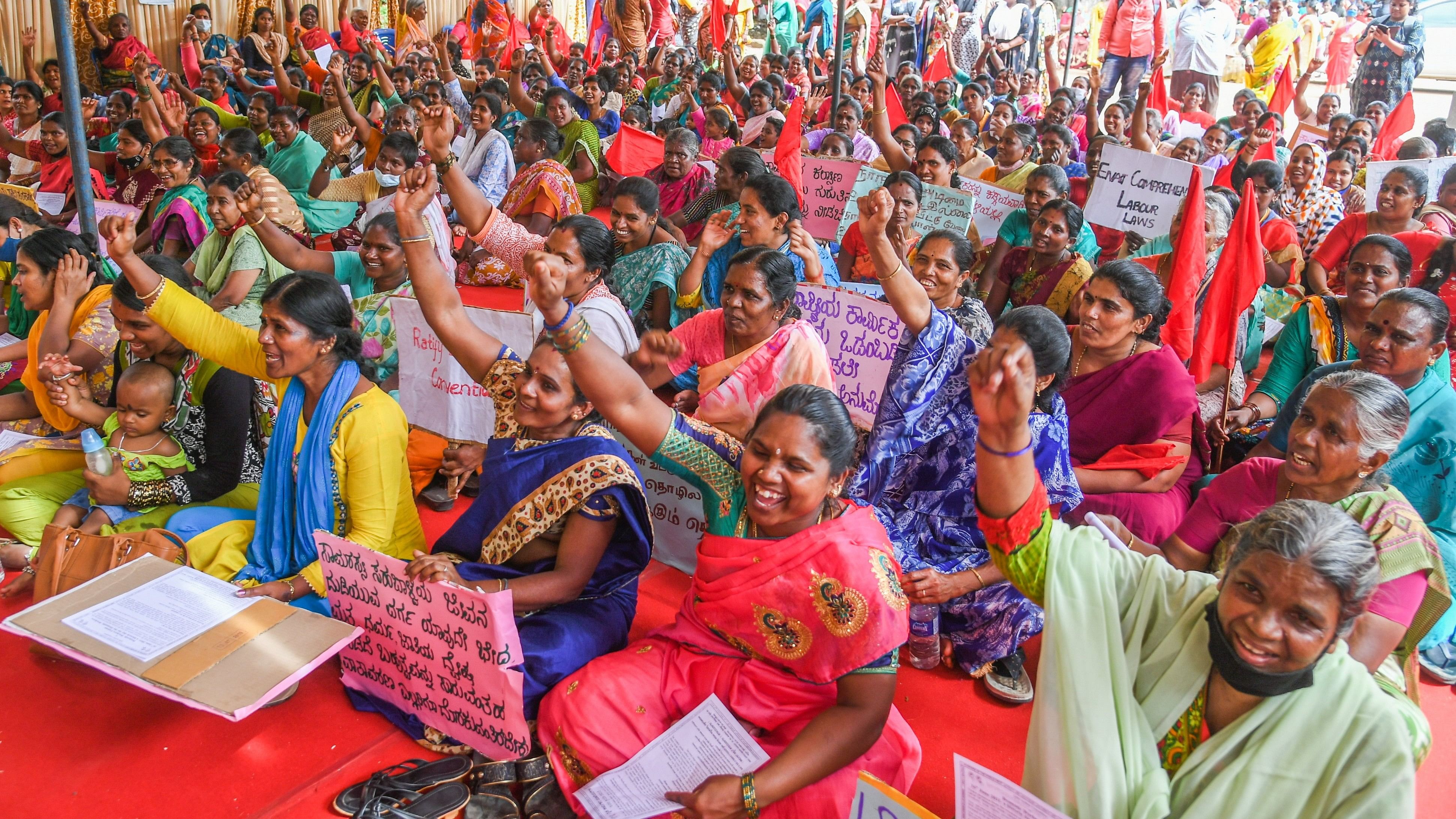
Members of various Domestic Workers Union are participated in Domestic workers day and demanding implement ILO Convention 189 resulations, registration of all workers in the Welfare board, enactment of comprehensive labour law, setting up areas committees to prevent sexual harassment at work place organised by Joint Action committee of Domestic Workers Union at Freedom Park in Bengaluru on Thursday, 16th June 2022.
Credit: DH photo/ S K Dinesh
Activists say the ‘exploitation’ case involving a billionaire Indian family in the UK should hold a mirror to the precarious lives of domestic workers. They say a national legislation to protect domestic workers is long pending.
“India has not ratified the ILO Domestic Workers Convention No 189,” says Geetha Menon, joint secretary, Domestic Workers’ Rights Union (DWRU), which is active in Bengaluru, Mangaluru and Belagavi.
The convention requires governments around the world to protect domestic workers against abuse and to ensure they get rest hours, minimum wage, and freedom to choose where they live or spend their leave.
Domestic workers in Karnataka are entitled to minimum wages (Rs 13,413 to 15,086 per month depending on tasks), and centrally, they are covered under the Prevention of Sexual Harassment (PoSH) at Workplace Act. But Geetha dubs these safeguards “weak”. She says the first doesn’t make a mention of punishment for non-compliance and the second doesn’t recognise a domestic worker’s workplace (a private house) as a workplace.
‘Called thieves’
Domestic workers in the city are commonly forced to use separate lifts and utensils, and are denied weekly off. Their wages are deducted if they take leave for festivals. “Migrant workers are often paid less than locals,” says advocate Vinay Sreenivasa.
They are also barred from using the toilet during work. Recalling a case from a gated villa, Geetha said, “During work hours, the domestic worker was neither allowed to use the toilet inside the villa nor at her servants’ quarter outside. The lady of the villa felt opening the door many times would let mosquitoes or cockroaches in.” Some domestic workers, thus, don’t drink water for six to eight hours.
Accusing them of theft at the house is a recurring form of abuse, according to Nisha Mathew, founder of Karuna Domestic Workers Welfare Trust. Most often, they turn out to be innocent, she said. Geetha says DWRU has written to the Bengaluru police “several times” to bring in protocol to pursue such cases — domestic workers are branded ‘thieves’ and lose job opportunities even before the investigation concludes.
Placement abuse
Activists say live-in domestic workers have it worse, bordering that of bonded labour. Maitreyi Krishnan, advocate and member of All India Central Council of Trade Unions, says it’s a highly unregulated space because these workers, migrants from up north, are at the beck and call of their employers 24/7. There is also no mechanism to monitor the working conditions. Often, their phone use is controlled and they aren’t allowed to walk outside. Sometimes, the agency that places them takes away their wages. Instances of sexual abuse have also been reported. Geetha had worked on a case of a girl who was kidnapped and placed by an agency. But instances of payment irregularities and child labour have come down as apartments are putting up notices discouraging such practices.
What happened
Last Friday, a Swiss court convicted four members of the Hindujas, Britain’s richest family, for alleged mistreatment of their domestic staff from India, at their villa in Geneva. They were accused of paying a pittance to the workers, confiscating their passports, and barring them from leaving the premises, in violation of Swiss labour laws. They were acquitted of charges related to human trafficking. Their spokesperson has since filed an appeal in a higher court challenging the verdict.
Demands
DWRU wants the government to establish a taskforce, a helpline, and a grievance redressal platform for domestic workers.